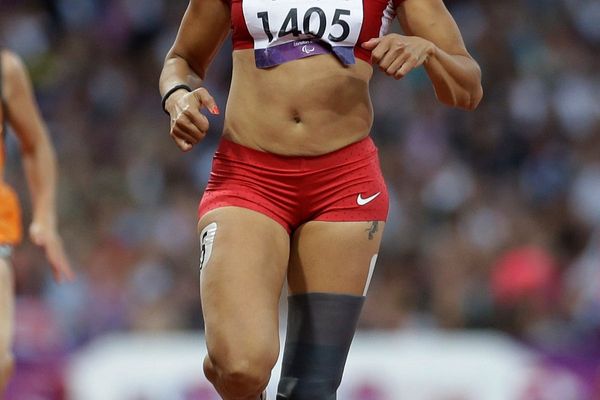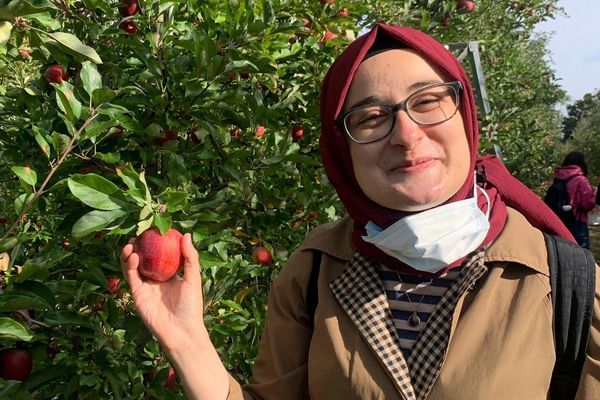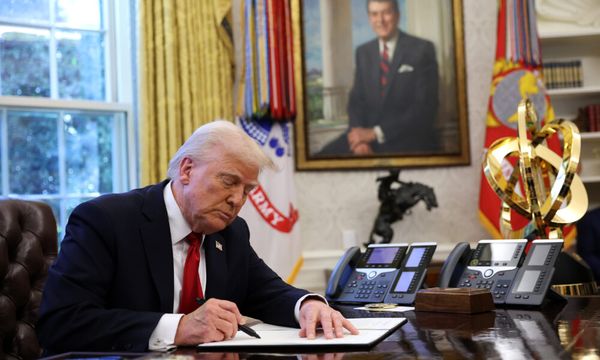
When Yuriko Kotani moved to the UK, she was confounded by our railway services. “Sometimes the train was delayed or the train didn’t come, and I couldn’t understand,” she says. “In Japan, people know that the train comes on time.” Years later, she still can’t rely on the trains here, but it did inspire a standup set about the British concept of “ish”, where everything is an estimate, in contrast to Japanese accuracy.
Such cultural comparisons are a juicy vein for standups. The Edinburgh fringe is always an international affair, with acts and audiences from across the globe. This year, there are shows from 58 countries. Starting your set with an observation that is familiar to the audience bridges cultural boundaries in two ways, says the Indian comedian Vir Das, who is in Edinburgh as part of a world tour. “One, they tell people that we have something in common. Establishing that allows me to then take you to the completely unrelatable. And two, I like comedy that is positive and uplifting, and if we establish that we’re not alone, that’s an enduring footing for a comedy show.”
For comics performing in their adopted country, observing local quirks can be a winning strategy. Lara Ricote, the winner of the Funny Women award 2021, is Mexican, grew up in Miami and now lives in the Netherlands. She mostly performs in English, but also runs her own Spanish-language comedy night in Amsterdam. Starting out, she found interesting material in comparisons between Mexican-Catholic culture “where the relationship with your body is: don’t touch it!” and Dutch culture, “where people are free and naked”. More recently, she’s written jokes about “how, when they’re correct, the Dutch are ruthless”, she says. “They’ll push you off the bike if you’re on the wrong side – with their hands, from a car, yelling at you!”

Argentinian Victoria Olsina, who is performing in a queer triple bill at the fringe, started standup in the UK partly because she “felt the need to be understood here. British culture is very different from Argentine culture – comedy is a device that you can use to bridge those differences.” She realised British people didn’t have much knowledge of Argentina. “I’m like a blank immigrant,” she says. Olsina used the Spice Girls as a segue into talking about her sexuality and Argentinian beauty standards. When she wanted to joke about the Falkland Islands, she wrote a love poem to Priti Patel: “I wish I was the Falkland Islands so you could occupy me indefinitely against international law.”
But while there’s no shortage of material, what about the practicalities of switching languages? “You almost have to be 100 times funnier to be funny in Danish,” says Sofie Hagen, who started her comedy career in Denmark, but now lives in the UK and performs in English. “If I wanted to construct an English sentence that was funny, I have a lot more words to choose between. In Danish, there’s only one way of doing that sentence, so you have to be really creative.” While Danish material easily translated into English, when Hagen started writing new jokes in English, they required rewrites and testing at open mics to make them funny in Danish.
Hagen noticed UK comedians’ funniest jokes often wouldn’t work written down, but “a Danish comedian’s joke will always work on paper”. This means a different vibe at comedy nights: in Denmark, there’s no audience interaction; comedians stick to a script. In the UK, shows are chattier and there are different forms of comedy. “In Denmark, we didn’t have alternative comedy. If anyone came on stage dressed up, we’d be like, ‘No, absolutely not. This is not comedy,’” Hagen says.
While Ricote says much of her material is translatable between English and Spanish, there’s a joke about systemic racism that has proven tricky: “I have the language in English, but it felt Google-translated to say some of those phrases in Spanish.” Ricote’s onstage persona also differs depending on the country. “Spanish is my at-home language, so it’s the language I’m most childish in. I’m freer in Spanish, I do more accents, it feels more silly,” she says. “Whereas in English, I craft jokes more, I take comedy more seriously.”
The question of persona can quickly become existential, says Hagen. “I often think: am I even the same person when I’m in Denmark speaking Danish? It’s so much about the cultural understanding that you have with the people you’re talking to.”
Olsina only performs in English. If she did standup in Spanish, she says: “I would tell more stories. We don’t have one-liners, puns, dad jokes. Storytelling is the main genre of comedy in Spanish.” When Kotani came to the UK, sarcasm confused her, but now she delights in using it. In Japan, she says the most common style of comedy is the manzai double act, with the silly boke and straight tsukkomi who reacts to the other with the phrase nandeyanen (“I would translate that as something like ‘Why are you saying that?!’”).
Ricote describes something similar in Mexican comedy – a tendency to emphasise punchlines with an exclamation, “like pointing at the joke in a slapstick-y way”, which becomes a joke in itself. The contrast was clear to Ricote after watching The Play That Goes Wrong in Mexico, then again in the UK. “In Spanish, there were many jokes about the fact that they did a joke.” This sort of approach doesn’t translate well to English, Ricote says, where it can feel “too old school”.
While Das acts in Hindi, English is his first language. At comedy nights in Mumbai, the bill is often evenly split between English and Hindi sets. “If you look at Hindi or Punjabi, it’s drier and more poetic. There’s more space between punchlines, it’s more storytelling and it’s really quite profound,” he says.

Indian standup in the English language is only recently coming into its own, Das says: “For a long time comedians were pandering to a palatable version of ‘the Indian’ for the west – because the west represented the mecca of standup. So we were doing surface-level material and not really telling our stories. It took us a while to say, ‘We can be from India and tell an authentically Indian story.’”
Das incisively tackled his home country’s contradictions in his Two Indias monologue in 2021, receiving a standing ovation from a US crowd and much praise online, but also backlash, with the right-wing BJP party reporting Das to the police in India. Are stakes higher for comedians in certain countries? He doesn’t think so. “We’re rounding the corner on the fact that comedy is now a two-way conversation,” he says. “Now the audience’s voice is as loud as yours. As long as the reaction or feedback is within the limits of the law, I’ll always listen.”
For some comics, certain styles work better in certain countries. “I don’t think we in Denmark are very good at making fun of ourselves,” Hagen says. “We’ve been fed that we’re the happiest, best country in the world. Whereas in the UK, there’s a lot of self-deprecating humour.” It wasn’t until doing comedy in the UK that Hagen noticed how “Danish comedy is very characterised by not having any limits. The way UK rightwing edgelords talk about comedy, like: ‘I’m allowed to say anything, it’s just satire’ – the majority of the Danish comedy scene is like that.” Feminism was the butt of jokes when Hagen was starting out and you had to be “one of the boys” to be accepted.
“So I came to the UK doing all my misogynistic material and had London audiences look at me like, ‘What on earth are you doing?’” Now, Hagen’s comedy is progressive and nuanced, but “I don’t know how long it would have taken me to change my mind if I hadn’t moved to London and been confronted.” Hagen is happy to report that queer and feminist comedy nights are now emerging back home.
Das believes that, with the help of the internet, we’ve entered a new era of international comedy. “There is a lot more global common ground than there used to be,” he says, citing the pandemic and protests. “I want to create content out of India that is consumable by people anywhere in the world. It’s more important to tell an authentic story. When I would watch Dave Chappelle talk about Ohio or Richard Pryor talk about Illinois, I don’t know those neighbourhoods or those references, but it takes me on a journey.”
“A lot of my material is personal, about family, body stuff, love, and that’s universal,” adds Hagen, who has performed in nearly 30 countries. “The essential language of humour is surprise, being able to relate to something, empathy and irony. Humour is not as local as we think it is.”
Sofie Hagen and Lara Ricote are at Monkey Barrel Comedy Club; Victoria Olsina is in Clandestina Queer Comedy Triple Bill at the Liquid Room Annexe; Vir Das is at the Pleasance Courtyard; and Yuriko Kotani is at Pleasance Dome
• Do you have an opinion on the issues raised in this article? If you would like to submit a letter of up to 300 words to be considered for publication, email it to us at guardian.letters@theguardian.com







